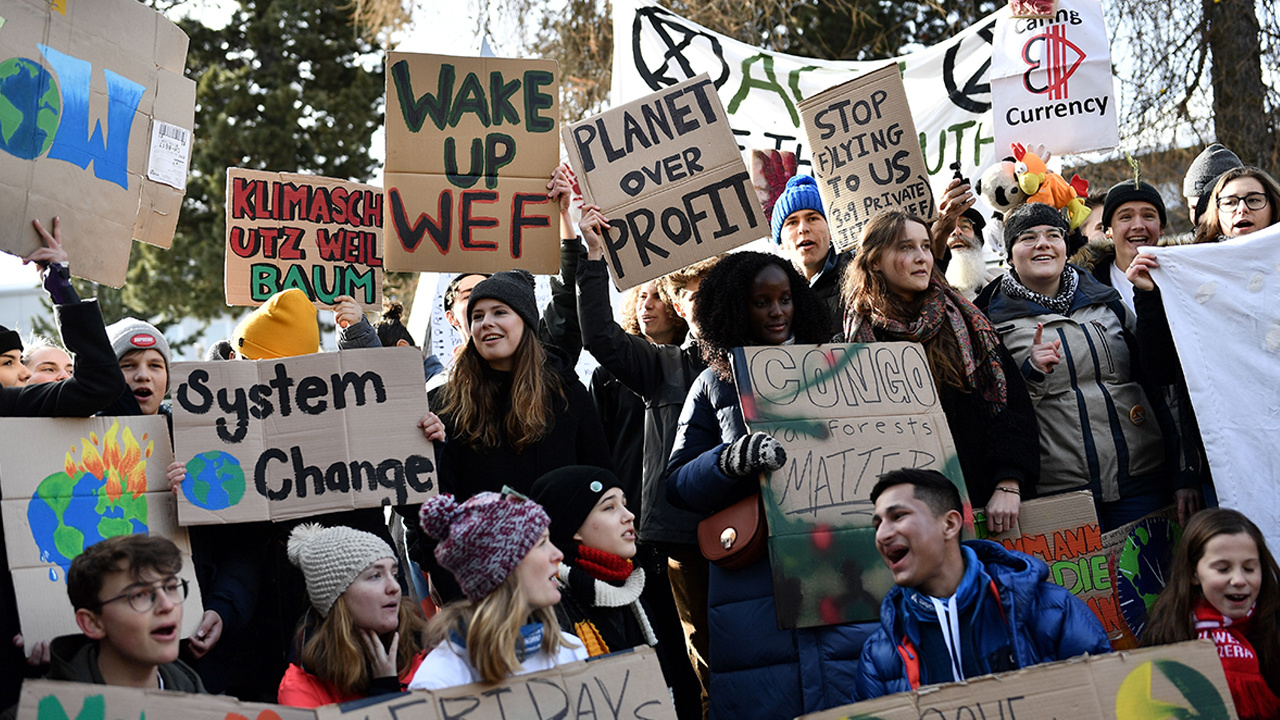
‘We Have So Much More to Do’: Youth Climate Activists Declare as Global Elite Close Out Davos Forum

Protesters march during a "Friday for future" youth demonstration in a street of Davos on Jan. 24 on the sideline of the World Economic Forum annual meeting. FABRICE COFFRINI / AFP / Getty Images
By Andrea Germanos
Youth climate activists marched through the streets of Davos, Switzerland Friday as the World Economic Forum wrapped up in a Fridays for Future demonstration underscoring their demand that the global elite act swiftly to tackle the climate emergency.
Among those taking part in the march were Rise Up Movement founder Vanessa Nakate of Uganda and School Strike for Climate trailblazer Greta Thunberg of Sweden. Thunberg has already taken forum participants to task this week for their vacuous promises and insufficient plans to rein in planet-cooking emissions.
WEEK 59 #ClimateStrike in Davos w/@GretaThunberg @Luisamneubauer @isabelle_ax and so many more amazing activists! We got a lot of work done this week, but we have so much more to do. See you next year #WEF2020 #WEF20 @wef pic.twitter.com/EGp9GesOUq
— Alexandria Villaseñor (@AlexandriaV2005) January 24, 2020
“As long as the science is being ignored, as long as the facts are not being taken into account, and as long as the situation is not being treated as a crisis, then world and business leaders can of course continue to ignore the situation,” Thunberg said at a news conference Friday.
Thunberg’s headline-grabbing voice is just one part of a loud and youthful chorus at the summit. One of the stages for this chorus has been the “Arctic basecamp,” a scientist-created concept to highlight at the annual forum the climate crisis’s particular threat to the region.
The basecamp hosted several young activists at this year’s summit, including Nakate, who talked to CNBC International about the discrepancy between the campers and the jet-setting forum-goers.
“We are just trying to show them that we are doing the right thing despite the fact that we are not sleeping or staying in the best conditions,” Nakate told the outlet. “And, as they are enjoying their first class (flights), they should know that there are people who are actually living in worse conditions.”
“So, we are practically representing those people who are already facing the impact of the climate crisis. It is time to get out of our comfort zones,” she added.
Interview with @CNBCihttps://t.co/KuuW6i3ZBD#Davos2020 #WEF20 pic.twitter.com/Rq1FDg7ab4
— Vanessa Nakate (@vanessa_vash) January 23, 2020
Nakate joined fellow Arctic Basecamp guests Kaime Silvestre of Brazil, Brooks Whiteman of England, Eva Jones of the U.S. and Wenying Zhu of China for a roundtable discussion Tuesday with Rolling Stone.
During the discussion, Nakate expressed her frustration with the lack of concrete and sufficient commitments at summit, saying, “What they do is speak and promise but they don’t take action.”
Corporate media coverage of the climate crisis also came in for criticism, with Nakate saying the recent torrential rains falling in African nations have not received the scope of coverage as other disasters elsewhere in the world.
“I have no problem with them reporting other disasters, but we saw the California fires and they would report about them every day,” said Nakate. “We’ve seen the Australian fires, and they’ve been reporting about them every day, and donations have been coming out to those kinds of people. It really saddens me because there are people as well in African countries.”
That erasure of humanity was punctuated Friday, when Nakate said she was temporarily “cropped out” of a photo accompanying an Associated Press article. The omission, Nakate suggested, was intentional.
The original photo showed five climate activists. The four that remained — Luisa Neubauer, Greta Thunberg, Isabelle Axelsson and Loukina Tille — are white.
If you look very carefully, you can see where @AP cropped black climate activist @vanessa_vash out of the photo
It might surprise some, but black and brown people being affected by the #ClimateEmergency are also helping to find the solutions too#ClimateCrisis pic.twitter.com/LoEzE81g67— Charlene (@CK1london) January 24, 2020
In a video she shared on Twitter, Nakate said, “This is the first time in my life I understood the definition of racism….Does it mean that I have no value?”
“Africa is the least emitter of carbon but we have [been] the most affected by the climate crisis. But you erasing our voices won’t change anything.”
Share if you can
What it means to be removed from a photo! https://t.co/1dmcbyneYV— Vanessa Nakate (@vanessa_vash) January 24, 2020
BuzzFeed reported on the photo change and included a comment from AP.
“There was no ill intent,” an AP spokesperson told the outlet. “AP routinely publishes photos as they come in and when we received additional images from the field, we updated the story. AP has published a number of images of Vanessa Nakate.”
Reposted with permission from Common Dreams.
- Greta Thunberg Punches Back After Treasury Secretary Mnuchin ...
- 4 Ways to Be a Real Youth Activist - EcoWatch
- Stories From the Youth Climate Movement in the Global South - EcoWatch
- Stories From the Youth Climate Movement in the Global South

 233k
233k  41k
41k  Subscribe
Subscribe 